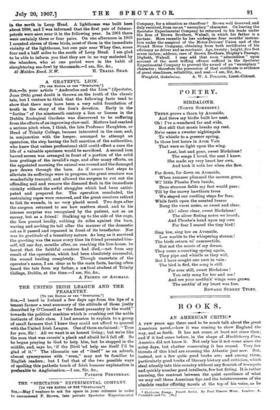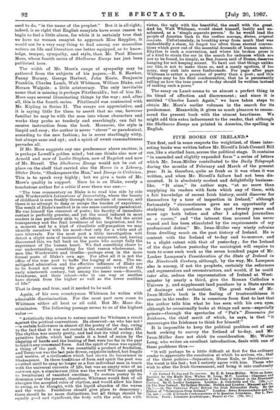BOOKS.
AN AMERICAN CRITIC.*
A FEW years ago there used to be much talk about the great American novel,—how it was coming to show England the way, and so forth. It has not come, at least not since then; and if it had come before, in the shape of Huckleberry Finn, America did not know it. Not only has it not come since the noisy days, but chatter concerning it has ceased. Very few threats of this kind are crossing the Atlantic just now. But, instead, not a few quite good books are; and among them, particularly good books of literary history and criticism, which steal silently into this country without any flourish of trumpets and quickly number good intellects, few but fitting. It is rather amusing, the contrast between the quiet excellence of what we may call these American figs and the boisterousness of the obsolete vendor offering novels at the top of his voice, as he • Shelburne Essays: Fourth Series. By Paul Elmore More. London A. ronstablo and Co. [5s.] used to do, "in the name of the prophet." But it is all right; indeed, is so right that English essayists have some reason to begin to feel a little alarm, for while it is certainly true that we have no woman essayist to approach Miss Repplier, it would not be a very easy thing to find among our masculine writers on life and literature one better equipped, as to know- ledge, temper, sympathy, and style, than Mr. Paul Elmore More, whose fourth series of Shelburne Essays has just been published here.
The width of Mr. More's range of sympathy may be gathered from the subjects of his papers,—R. S. Hawker, Fanny Burney, George Herbert, John Keats, Benjamin Franklin, Charles Lamb, Walt Whitman, William Blake, and Horace Walpole : a little aristocracy. The only inevitable name that is missing is perhaps FitzGerald's ; but of him Mr. More says several illuminating things by the way ; and, after all, this is the fourth series. FitzGerald was contrasted with Mr. Kipling in Series II. The essays are appreciative, and it is saying little for them to assert that no one, however familiar be may be with the men into whose characters and works they probe so tenderly and searchingly, can fail to receive instruction from the book. Moreover, the style is limpid and easy ; the author is never " clever " or paradoxical, according to the new fashion ; he is never startlingly witty, but always sane and apt; and a spirit of sweet reasonableness pervades all.
If Mr. More suggests any one predecessor above another, it is perhaps Lowell's golden mind ; but one thinks also now of Arnold and now of Leslie Stephen, now of Bagehot and now of Mr. Birrell. The Shelburne Essays would not be out of place on the shelf that carried also the Hours in a Library, Obiter Dicta, "Shakespeare the Man," and Essays in. Criticism. This is to speak very highly ; but we give a taste of Mr. More's quality in support. Here he is on Blake, surely a touchstone author for a critic if ever there was one :— " The true commentary on Blake is to read him side by side with Wordsworth's Intimations of Immortality, where the beauty of childhood is seen frankly through the medium of memory, and there is no attempt to deny or escape the burden of experience. The result of Blake's method is in one sense curiously paradoxical. He was himself the sincerest of poets ; his faculty of immediate contact is perfectly genuine, and yet the mood induced in most readers is one perilously akin to affectation. We feel the aerial transparency and the frail loveliness of his inspiration, and for a moment and by a kind of ritualistic self-purgation we may identify ourselves with his mood—but only for a while and at rare intervals. For the most part a little investigation will detect a slight note of insincerity in our enjoyment, and, having discovered this, we fall back on the poets who accept fully the experience of the human heart. We find something closer to our understanding, something for that reason wholesomer, in men like Wordsworth and Goethe—perhaps even in the more formal poets of Blake's own age. For after all it is not the office of the true poet to baffle the longing of men. The un- mitigated admiration and the effective influence of Blake are , to be found not among the greater romantic writers of the early nineteenth century, but among the lesser men—Rossetti, Swinburne, and their school—who in one way or another have shrunk from the higher as well as the lower realities of life."
That is deep and true, and it needed to be said.
Again, of his own countryman Whitman he writes with admirable discrimination. For the most part men come to Whitman either all heat or all cold. But Mr. More dis- criminates. The following passage seems to us of the highest value :—
" Artistically this return to nature meant for Whitman a revolt against the poetical conventions. He observed—as who has not ? —a certain hollowness in almost all the poetry of the day, owing to the fact that it was not rooted in the realities of modern life. The rhythm was merely pretty, and had lost its vital swing ; the primitive habits which had made it a bond of union by the clapping of hands and the beating of feet were too far in the past to lend it any communal force. And the spirit of verse was equally a thing of the past. It was essentially a product of feudalism, and Tennyson was the last pale flower, exquisite indeed, but fragile and useless, of a civilisation which had shown its luxuriance in Shakespeare. In these traditions of form and spirit the poet was swathed until he sang no longer as a free individual man in touch with the universal currents of life, but was an empty echo of an outworn age, a simulacrum (this was the word Whitman applied to Swinburne) of vanished emotions. To restore poetry to its dominion over the present, therefore, Whitman would first of all abrogate the accepted rules of rhythm, and would allow his lines to swing, so he thought, with the liquid abandon of the waves and the winds. Feudalism should give place to democracy ; ; there should be no more distinctions, but all things should be I equally good and significant, the body with the soul, vice with i virtue, the ugly with the beautiful, the small with the great. And he, Walt Whitman, would chant himself, lustily and un- ashamed, as a 'simple separate person.' So he would lead the people of America back to the codicils average, divine, original concrete. Unfortunately, in breaking away from much that was undoubtedly a sham, he forgot too often those eternal conven- tions which grow out of the essential demands of human nature. Rhythm is such a convention, and where his broken in-ose is of a kind to strain the ear in the search for cadences which are not to be found, he simply, as Ben Jonson said of Donne, deserves hanging for not keeping accent. To bawl out that things unlike are like, is not to make them so, and a manly egotism, if too noisy, may sink into mere fanfaronade. For page after page Whitman is rather a preacher of poetry than a poet; and this perhaps may be his final condemnation, that he is persistently telling us how the true poem of to-day should be written instead of making such a poem."
The essay on Lamb seems to us almost a perfect thing in its blend of affection and discernment ; and since it is entitled "Charles Lamb Again," we have taken steps to obtain Mr. More's earlier volumes in the search for its predecessor. Meanwhile, it gives us much pleasure to recom- mend the present book with the utmost heartiness. We might add this extra inducement to the reader, that although the Shelburne Essays are printed in America, the spelling is English.







































 Previous page
Previous page